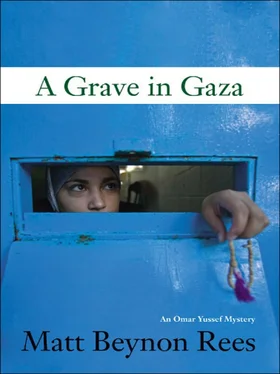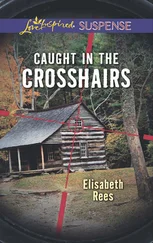Matt Rees - A grave in Gaza
Здесь есть возможность читать онлайн «Matt Rees - A grave in Gaza» весь текст электронной книги совершенно бесплатно (целиком полную версию без сокращений). В некоторых случаях можно слушать аудио, скачать через торрент в формате fb2 и присутствует краткое содержание. Жанр: Криминальный детектив, на английском языке. Описание произведения, (предисловие) а так же отзывы посетителей доступны на портале библиотеки ЛибКат.
- Название:A grave in Gaza
- Автор:
- Жанр:
- Год:неизвестен
- ISBN:нет данных
- Рейтинг книги:5 / 5. Голосов: 1
-
Избранное:Добавить в избранное
- Отзывы:
-
Ваша оценка:
- 100
- 1
- 2
- 3
- 4
- 5
A grave in Gaza: краткое содержание, описание и аннотация
Предлагаем к чтению аннотацию, описание, краткое содержание или предисловие (зависит от того, что написал сам автор книги «A grave in Gaza»). Если вы не нашли необходимую информацию о книге — напишите в комментариях, мы постараемся отыскать её.
A grave in Gaza — читать онлайн бесплатно полную книгу (весь текст) целиком
Ниже представлен текст книги, разбитый по страницам. Система сохранения места последней прочитанной страницы, позволяет с удобством читать онлайн бесплатно книгу «A grave in Gaza», без необходимости каждый раз заново искать на чём Вы остановились. Поставьте закладку, и сможете в любой момент перейти на страницу, на которой закончили чтение.
Интервал:
Закладка:
Omar Yussef was touched by this sad display of hospitality. He poured some of the water into his mouth. It tasted of lead. “Thank you.”
Odwan shifted his crossed legs and rubbed his back, grimacing. “I went to meet Salah. He was selling something.”
“What?”
“Something he stole from us.”
“From the Saladin Brigades?”
“Uncle, you don’t want to get involved in this.”
Omar Yussef leaned forward. “Believe me, I’m involved already. I must know.”
Odwan glanced at Cree. “How do I know this foreigner isn’t a spy?”
“Because he doesn’t speak Arabic,” Omar Yussef said. “Anyway, all the spies in Gaza are Palestinian.”
Odwan’s eyes flicked to Sami, relaxed by the door. Then he grinned. “I’m glad you came, uncle. May Allah give strength to your friend from Sweden and lead him home.”
Omar Yussef nodded and raised his eyebrows expectantly.
Odwan sighed. “We had arranged to receive a prototype missile. It was smuggled through one of the tunnels under the Egyptian border. Salah was selling this missile.”
“But there are missiles already in Gaza. The Qassam missiles.”
“We wanted to improve on the Qassam. To build a more reliable missile with a longer range.”
“What difference does it make to bring in a single missile?”
“The Qassam was based on a prototype North Korean missile that was smuggled through the tunnels a few years ago with the help of Hizballah in Lebanon. The engineers here used that prototype to build hundreds of our own missiles. We intended to do the same thing again, only better.”
“So this stolen missile was to be replicated to create a new arsenal of advanced missiles?”
“Abu Jamal was going to call it the Saladin I. Sounds good, doesn’t it?” Odwan seemed as proud as if the name had been his own invention.
Omar Yussef nodded his encouragement.
“Someone stole the missile as it was coming through the tunnels,” Odwan said. “They must have paid a traitor inside the Brigades to tell them about the plan. They ambushed our guys just after we brought it through. They killed two of them and stole the missile.”
“Lieutenant Salah stole it?”
Odwan rolled his tongue in his cheek. “The day after it was stolen, Salah contacted Abu Jamal and told him he had the prototype. Abu Jamal ordered me to meet Salah to make sure he was telling the truth. If he was, Abu Jamal would give him the money.”
“Why would you pay him for something he stole?”
“The important thing was to get the missile immediately. We could settle our score with Salah later.”
“How much did Salah want?”
“Twenty thousand dollars-it’s a lot in Rafah. So I met Salah on the edge of the refugee camp, late at night. It was a quiet spot; there were buildings around us, but they were bombed-out and empty. I left my car and walked toward Salah’s jeep.”
“He was alone?”
“Just him. I asked him to show me the crate with the missile. He said it was hidden somewhere else. We argued about that, because Abu Jamal didn’t want to hand over the money, unless I’d actually seen the missile. I walked toward my car to phone Abu Jamal. Salah followed me, talking nonsense. Then, there was a shot from somewhere. It hit Salah up here.” Odwan tapped his chest and it made a deep thump.
“What did you do?”
“I went straight to my car and got out of there. There were more shots from one of the bombed-out buildings. Someone was trying to kill me, too.”
“How many attackers were firing at you?”
“Just one. The reports all came from the same spot and I heard only one gun.”
“What did you do after you left?”
“I phoned Abu Jamal. He sent people to the scene. The security forces were already there. I went home and, when they came to arrest me, I gave myself up.”
Odwan was quiet. Omar Yussef tried to hide his excitement. If Odwan was telling the truth, he wasn’t the killer. General Husseini might be persuaded to free him, if they could only prove it. But that also meant there was a killer on the loose who’d do everything he could to prevent Omar Yussef identifying him.
Odwan shook his head. “It didn’t make sense.”
“What didn’t?”
“Every time I asked him where he’d hidden the missile, Salah kept saying something in a foreign language. I think it was English. Do you speak English, uncle?”
Omar Yussef nodded.
“What does price mean?” Odwan said.
“It means the cost of something.”
“I thought so. When I asked where the missile was, he kept saying something about the price, and I’d say, ‘Okay, you’ll get your money, but speak Arabic and tell me where the missile is.’ Then he’d say something about the price again. I feel sorry about it now, but at the time I admit I became angry, because I thought he had lost his nerve under pressure.”
“Did he say anything else in English, or just the word price?”
“He said high noon price.”
“ High noon price?”
“Something like that. ‘You’ll get it,’ he said, ‘at high noon price.’ What does that mean, uncle?”
“The cost when the sun is high at noontime. Or the cost at noon is expensive.”
“You see, it doesn’t make sense. It was midnight, not noon, and I already knew the price. It made me furious with him.” Odwan shot his fist into his palm in frustration. “But after the poor man was shot, I started to think about it. He really was trying to tell me something. He seemed desperate when he followed me to the car, still repeating this crazy English phrase. But someone wanted to kill him-perhaps he knew that.”
Omar Yussef pictured the blabbering Salah, frantically trying to convey a message to Odwan, and the simple gunman, too hard-bitten to understand. “What happened to the missile? Did Abu Jamal do a deal to buy it later?”
“I don’t know. You’d have to ask Abu Jamal. I haven’t heard anything since they arrested me.”
“Why did you give yourself up?”
“I could have escaped.” Odwan looked about and lowered his voice. “There’s a tunnel under my family’s house that leads across to Egypt. It’s supposed to be only for ferrying goods, cigarettes and baby formula and that sort of stuff. You have to haul everything through on a little cart that runs on metal tracks using a pulley at each end. It would have been a horrible squeeze for a man of my size, but I could get through there, just about.”
“Why didn’t you?”
“They would have arrested my entire family. I have thirteen brothers and sisters, and a mother and father. If I ran, everyone would believe I had killed Salah and the police would’ve destroyed my parents’ house.” Odwan looked down at his big hands.
The prisoner sounded like a child in one of Omar Yussef’s classes, guilty about the lie he had spun to cover his own cowardice. Omar Yussef recognized the hesitations that undermined the falsehood.
Odwan looked up at Omar Yussef and saw that his deception had failed. “In my heart, Abu Ramiz, I just couldn’t go through the tunnel,” he said. “To my shame, I started to run away, despite the risk of reprisals against my family. I knew the police would torture me. I even climbed down to where the tunnel begins, but it was so narrow and long and dark that I feared I might become trapped. I was scared that I would die of suffocation down there.”
Omar Yussef took the Saladin Brigades leaflet from his breast pocket and showed it to Odwan. “Perhaps this will give you hope, Bassam.”
Odwan read the leaflet and gave it back. “Allah is my hope, Abu Ramiz.”
Omar Yussef put the leaflet back in his shirt pocket. “May Allah grant you grace,” he said, standing stiffly.
Читать дальшеИнтервал:
Закладка:
Похожие книги на «A grave in Gaza»
Представляем Вашему вниманию похожие книги на «A grave in Gaza» списком для выбора. Мы отобрали схожую по названию и смыслу литературу в надежде предоставить читателям больше вариантов отыскать новые, интересные, ещё непрочитанные произведения.
Обсуждение, отзывы о книге «A grave in Gaza» и просто собственные мнения читателей. Оставьте ваши комментарии, напишите, что Вы думаете о произведении, его смысле или главных героях. Укажите что конкретно понравилось, а что нет, и почему Вы так считаете.












